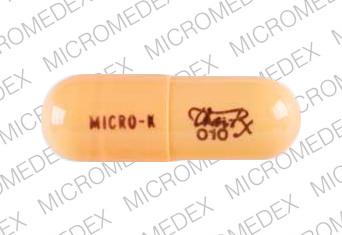Micro-K Side Effects
Generic name: potassium chloride
Medically reviewed by Drugs.com. Last updated on Jan 5, 2024.
Note: This document provides detailed information about Micro-K Side Effects associated with potassium chloride. Some dosage forms listed on this page may not apply specifically to the brand name Micro-K.
Applies to potassium chloride: oral tablet extended release.
Other dosage forms:
Serious side effects of Micro-K
WARNING/CAUTION: Even though it may be rare, some people may have very bad and sometimes deadly side effects when taking a drug. Tell your doctor or get medical help right away if you have any of the following signs or symptoms that may be related to a very bad side effect:
- Signs of an allergic reaction, like rash; hives; itching; red, swollen, blistered, or peeling skin with or without fever; wheezing; tightness in the chest or throat; trouble breathing, swallowing, or talking; unusual hoarseness; or swelling of the mouth, face, lips, tongue, or throat.
- Signs of a high potassium level like a heartbeat that does not feel normal; change in thinking clearly and with logic; feeling weak, lightheaded, or dizzy; feel like passing out; numbness or tingling; or shortness of breath.
- Slow heartbeat.
- Chest pain or pressure.
- Signs of bowel problems like black, tarry, or bloody stools; fever; mucus in the stools; throwing up blood or throw up that looks like coffee grounds; or very bad stomach pain, constipation, or diarrhea.
- Swelling of belly.
Other side effects of Micro-K
All drugs may cause side effects. However, many people have no side effects or only have minor side effects. Call your doctor or get medical help if any of these side effects or any other side effects bother you or do not go away:
- Stomach pain or diarrhea.
- Upset stomach or throwing up.
- Gas.
- Some products of potassium are in a wax matrix; you may see this in stool. The potassium has been taken into the body, but the wax has not.
These are not all of the side effects that may occur. If you have questions about side effects, call your doctor. Call your doctor for medical advice about side effects.
You may report side effects to the FDA at 1-800-332-1088. You may also report side effects at https://www.fda.gov/medwatch.
See also:
For healthcare professionals
Applies to potassium chloride: compounding powder, intravenous solution, oral capsule extended release, oral granule extended release, oral liquid, oral powder for reconstitution, oral tablet, oral tablet extended release.
Metabolic adverse events
- Frequency not reported: Hyperkalemia (including cardiac arrest as a manifestation), hypervolemia, hyponatremia and hyponatremic encephalopathy, hypokalemia[Ref]
Hyperkalemia can cause muscle weakness, paresthesia of the extremities, listlessness, mental confusion, flaccid paralysis, cold skin, grey pallor, peripheral vascular collapse, fall in blood pressure, paralysis, cardiac arrhythmias, and heart block. Electrocardiogram abnormalities include disappearance of the P-wave, widening and slurring of QRS complex, changes of the S-T segment, tall peaked T-waves. At extremely high concentrations (8 to 11 mmol/L) may cause death from cardiac depression, arrhythmias, or arrest.[Ref]
Gastrointestinal
- Frequency not reported: Nausea, vomiting, flatulence, abdominal pain/discomfort, diarrhea, obstruction, bleeding, ulceration, perforation, gastrointestinal hemorrhage, local irritation of the mucosa
- Postmarketing reports: Delayed intestinal transit[Ref]
Local
- Frequency not reported: Injection site pain, injection site phlebitis, infection at injection site, venous thrombosis extending from site of injection, extravasation[Ref]
Cardiovascular
- Frequency not reported: Cardiac arrhythmias, cardiac arrest[Ref]
Dermatologic
Other
- Frequency not reported: Febrile response[Ref]
References
1. Cerner Multum, Inc. "UK Summary of Product Characteristics."
2. Cerner Multum, Inc. "Australian Product Information."
3. (2016) "Product Information. Klor-Con M10 (potassium chloride)." Upsher-Smith Laboratories Inc
4. (2016) "Product Information. Potassium Chloride (potassium chloride)." Pharmaceutical Assoc Inc Div Beach Products
5. "Product Information. Potassium Chloride In Dextrose and S (LVP solution with potassium)." B Braun Medical Inc, Irvine, CA.
Frequently asked questions
More about Micro-K (potassium chloride)
- Check interactions
- Compare alternatives
- Drug images
- Dosage information
- During pregnancy
- Drug class: minerals and electrolytes
Patient resources
Other brands
Klor-Con, K-Dur, K-Tab, Kaon-CI, Rum-K
Professional resources
Other brands
Klor-Con, K-Dur, K-Tab, Slow-K, ... +3 more
Related treatment guides
Further information
Micro-K side effects can vary depending on the individual. Always consult your healthcare provider to ensure the information displayed on this page applies to your personal circumstances.
Note: Medication side effects may be underreported. If you are experiencing side effects that are not listed, submit a report to the FDA by following this guide.

